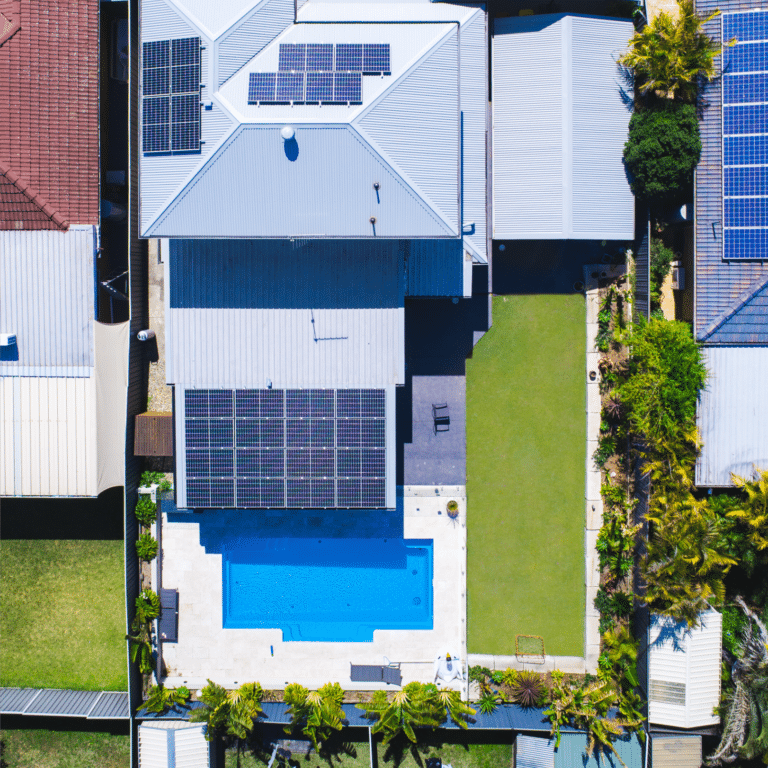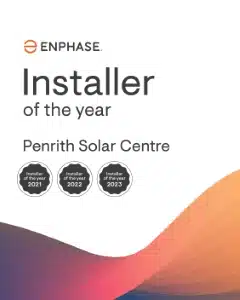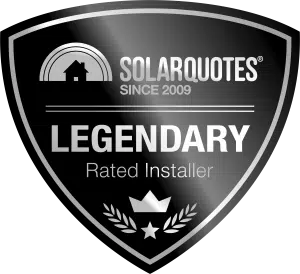
Are you energy-conscious and building a new home in New South Wales? If you are, you have probably already heard about BASIX.
BASIX stands for Building Sustainability Index. It is an assessment tool for builders that is used for the construction of residential buildings in NSW. The purpose is to help manage our energy efficiency as a community, starting with our homes.
At Penrith Solar Centre, we understand the ins and outs of solar and how to incorporate it into your home design to meet your unique energy needs and goals. We didn’t create BASIX. We’re not a great resource for information about how to navigate those requirements. It’s not a tool for solar installers, it’s a tool for builders.
However, we’re experts at solar, sustainable energy, and achieving Net Zero by 2050 (it’s kind of our thing). By talking to your architect and builder about solar at the beginning of construction based on recommendations from your solar installer of choice, you’ll be able to save a lot of money upfront on the build and twenty years from now when your solar is still cranking out power for you.
In this article, you will learn:
- What is BASIX?
- Why Am I Reading About BASIX On a Solar Installation Company Blog?
- What is Energy Efficient Housing?
- How Can I Make My Home Build Energy Efficient?
- BASIX links and Resources
By the end of this article, you will better understand what BASIX is and how a quality solar system and installation will contribute to meeting these requirements.
What is BASIX?
It’s getting hotter. Using fossil fuels as an energy source since the 1800s is destroying our planet – rapidly now. The government of New South Wales implemented energy efficiency requirements for all new home builds. Those requirements have changed and evolved since their implementation, expanding the program.
As we mentioned in the introduction, BASIX is a virtual tool (there is also an option for do-it-yourself types, though there are more requirements to meet) that helps builders and architects incorporate sustainability into home design.
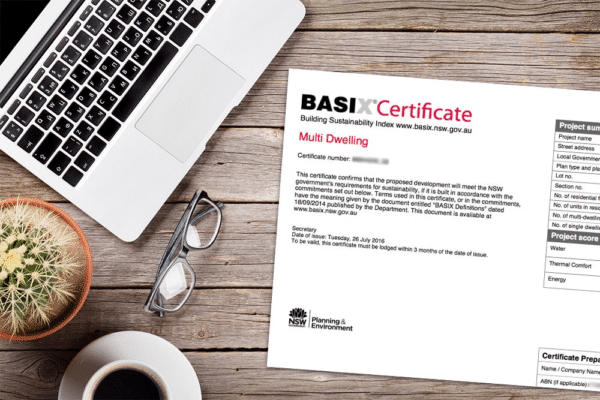
The goal of BASIX is to reduce the environmental impact of new builds in residential communities. There are certain standards for water and energy efficiency that each home must meet. The impact of the construction materials used is also calculated.
You need a BASIX certificate to verify your home is at a certain level of energy efficiency. Your architect will obtain a BASIX certificate after finishing a sustainability assessment using the online tool. The online tool requires them to input information about how energy efficient the home is to meet the water target, the energy target, and the thermal comfort target.
When do you need a basic certificate? Anytime you submit plans for approval to your local council. This applies whether you’re pursuing a Complying Development Certificate (CDC) or going through your local council. Both methods require a BASIX certificate. Usually, if the project costs over $20,000, you’ll need one. Smaller projects, like minor renovations or backyard decks, may not require it. BASIX certificates are essential for various projects, including granny flats, home extensions, or starting construction from scratch.
The BASIX certificate aims to establish a standard for energy efficiency in homes, reducing energy needs for heating and cooling, as well as for hot water and cooking.
Factors like window type, size, glass thickness, and orientation affect energy requirements.
Additionally, things like the wall and roof colour impact thermal conductivity, with dark colours absorbing heat and light colours reflecting it.
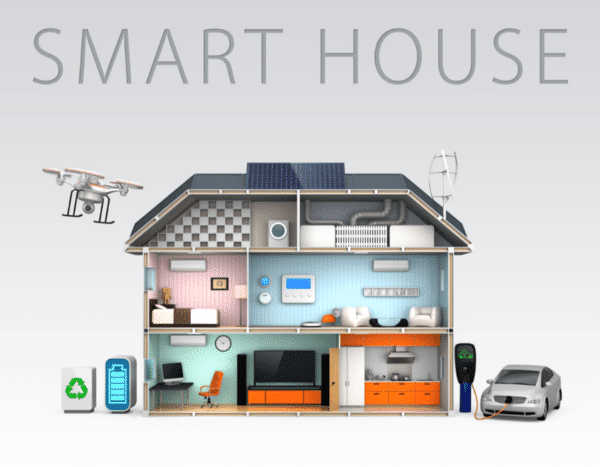
Or what type of foundation your home will have. There are two main types: concrete slabs or bearers and joists. Homes on poles offer advantages like easy access to plumbing and electrical work, while slab homes provide thermal mass. In hot climates, bearers and joists may perform better due to improved airflow, while slab homes retain heat longer in cold climates.
Once you make some decisions about how to make your home more efficient, and once you build your home, you’ll need a thermal comfort assessment. It’s an analysis of your home and the region you live in to establish how much artificial heating and cooling you will need to keep your home comfortable both in the summer and winter months. It evaluates how much energy you use to live.
The data about your build is inputted into the BASIX certificate system to generate a score. The system provides a pass or fail result based on set thresholds, which are updated every 18 months to two years. Failure to meet these criteria results in denial of approval, regardless of the type of application submitted.
To promote energy-efficient housing, the government introduced BASIX in 2004. BASIX sets targets in water, energy, and thermal comfort based on regional factors. There are all kinds of things you can do while building your home to help you reach BASIX requirements; from solar systems to planting native vegetation for shading.
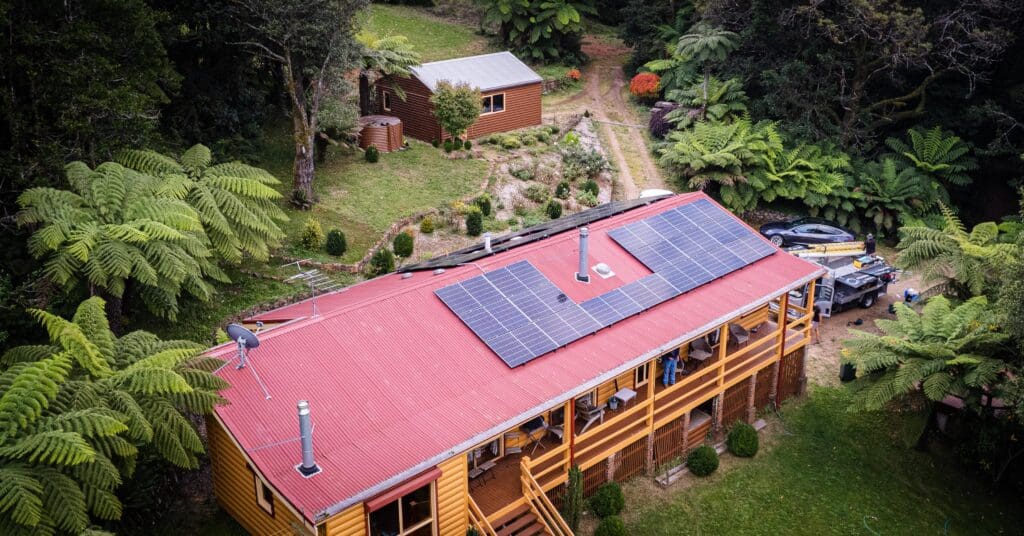
As the government rebate for solar is steadily decreasing, the requirements for BASIX are increasing and expanding possibilities for our nation.
It’s an exceptional program that we support.
If you’re interested in learning more about whether to buy a solar system through your builder, you might want to check out the following article titled, Questions to Ask Your Builder Before They Install Solar on Your Roof.
Why Am I Reading About BASIX On a Solar Installation Company Blog?
That’s a great question and we have an answer. It costs a lot of money to double-glaze your windows. Some folks who love to cook want a gas stove, which will tip your BASIX score towards failure (and it will probably be against the rules to install one in any New South Wales home soon).
Builders don’t care about how you pass your BASIX requirements. All they care about is getting the approval as fast as possible — as smooth as possible — for the best possible price. They don’t make any money during this part of the process.
It holds them up. They hate it. And they don’t get paid for all the consultation back and forward with the client changing this to that and it’s painful for everyone. There’s no incentive for the builder.
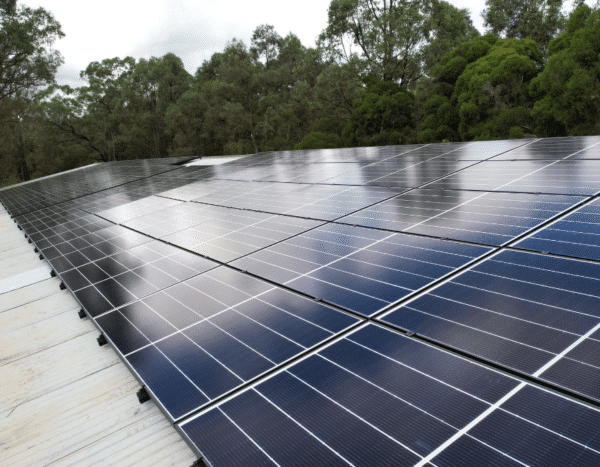
The reason we’re writing about BASIX is because of the importance of a solar system in getting your BASIX certificate. The cost of a small and inefficient solar system (that you’ll have to rip up in two or three years) is cheaper than the cost of double-glazing your windows.
Unfortunately, that solar system won’t do much for you other than guarantee that you get your BASIX certificate without having to spend money on other energy-efficient adjustments to your build.
We hate this. It’s a waste of time and money for you. It won’t help reduce your energy bills and will do little to reduce your carbon footprint. Furthermore, we hate how it “proves” to some folks that solar is a scam. It is not, we know it, you know it, but do they know it?
We know more about solar energy solutions than builders and architects. Period. If you’re interested in incorporating solar into the design of your home as you and your builders are trying to meet BASIX requirements, please reach out to a couple of solar companies for multiple quotes.
If you don’t mind leaving money on the table, then by all means, let your builder or architect choose your solar system.
We can save you tens of thousands of dollars and help you achieve a BASIX certificate.
What is Energy Efficient Housing?
Quite simply, it is a house that makes the most of natural resources. By designing and building residences that do this, homeowners can utilize natural resources like sunlight and air circulation to minimize electricity and gas usage. The idea is to eventually eliminate gas and rely on sustainable energy solutions (like solar power).
There are many ways to design and build an energy-efficient home. Choices like which compass direction the windows face or what type of insulation you install can make a huge difference in your power bill.
An efficient home reduces energy consumption and greenhouse gas emissions. At the same time, it provides more sustainable living conditions and can potentially save money. How much money depends on a lot of factors that you should discuss with an expert, we can only speak to how much money you’ll save with solar energy.
How Can I Make My Home Build Energy Efficient?
Building a new home or renovating an old one and meeting the BASIX requirements has some wiggle room. Choices made for energy efficiency in building materials can compensate for less environmentally helpful choices.
Again, we’re not giving you advice on how to make your home energy efficient, but these are some of the things considered when applying for a BASIX certificate.
Direct sunlight through windows heats the home because your windows are not as well-insulated as walls. In the summertime, you’ll want to shield north-facing windows. You’ll need to apply the same considerations for eastern and western-facing windows as well because the morning and afternoon sun shines through those windows too.
In the wintertime, windows will capture as much heat from sunlight to warm up living areas. Positioning living areas towards the north of your home with sizable windows (that have seasonal shading solutions for summer) allows for natural heating in winter.
If you’re interested in learning how home orientation contributes to solar efficiency, you might want to check out the following articles titled, Which Way Should Solar Panels Face in Australia? and Can You Install Solar Panels on a South-facing Roof in Australia?
While we’re talking about windows, we’d also like to drop in that installing windows strategically will get you some pretty awesome cross-ventilation to help keep your home cool as it warms up into summertime each year.
Insulation is crucial for maintaining heat in winter and coolness in summer. It’s the barrier between you and the elements. If you insulate your home well, you’ll be comfortable year-round. Good insulation can cut your heating and cooling costs by as much as 50%.
Landscaping and shading, such as planting trees, help keep the sun off any part of the home they are shading, which will keep the house cool in summer.

There are countless choices you can make regarding energy efficiency in your home, but honestly, you should not be consulting us for advice. We do solar.
We stay out of your builder’s way when it comes to building your home, and we would prefer the builder stays out of our way when it comes to installing solar for you. That doesn’t always happen though. If you’re interested in learning a little bit more about how to plan a build with solar in mind, you might want to check out the following article titled, How to Plan Solar for a New Home Build in Sydney.
BASIX links and Resources
The New South Wales government website is a very helpful resource for BASIX information. They came up with the requirements, after all. You might want to start with the About BASIX webpage which has a BASIX-related table of contents along the right side of the page.
The NSW government website also has a lovely BASIX Development and Assessment tool with subjects grouped together at the bottom of the page.
There are numerous consulting firms for architects and builders that have comprehensive blogs and videos covering every aspect of meeting the BASIX requirements for new builds.
Power You Going to Install Your Solar with BASIX?
Now you know more about BASIX and how working within those parameters might affect solar installation choices. Things like where you install your windows to what type of floor you have will affect the efficiency of your home and possibly your choices around solar.
There’s a lot to understand about solar efficiency – you’ll want to speak with an installer who can walk you through efficiency considerations to maximise your BASIX evaluation. Transparency, in our experience, ends up saving time and money for everyone – you, us, and them.
At Penrith Solar Centre, we understand that there are lots of considerations for installing a new solar system. Your goals and needs are unique. We understand the complexities of solar installation, but we also understand the complexities of working with builders, and we’re here to help you navigate those relationships as you install solar on your new home.
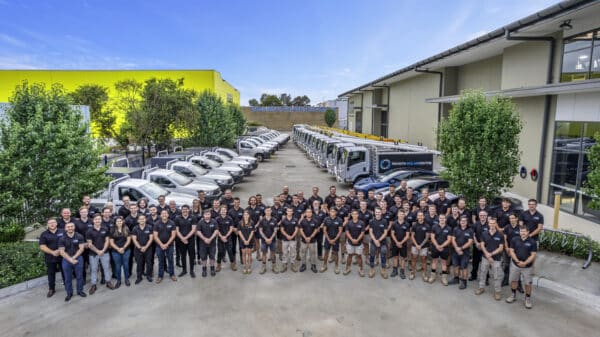
If you’re interested in learning more about how to start your solar journey, you might want to check out the following article titled, How to Shop for Your Solar System.



